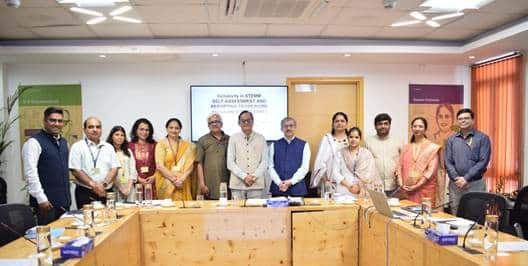PSA Prof. Ajay Sood Chairs Meeting on Operationalisation

The Office of the Principal Scientific Adviser (PSA) to the Government of India held a significant meeting on May 28, 2025, to discuss the implementation of the Self Assessment and Reporting Framework on Inclusivity in Science, Technology, Engineering, Mathematics, and Medicine (Inclusivity-STEMM-SARF). Chaired by Prof. Ajay Kumar Sood, the meeting brought together key stakeholders, including members from the Capacity Building Commission and the Department of Higher Education. The initiative aims to create a more inclusive STEMM ecosystem in India, addressing various dimensions of diversity and equity.
Significance of Inclusivity in STEMM
During the meeting, Prof. Sood emphasized the critical need for inclusivity within the STEMM fields. He stated that fostering a diverse ecosystem is not merely a moral obligation but also essential for scientific advancement and development. Prof. Sood highlighted that diverse perspectives lead to enhanced innovation and more relevant research outcomes. In the context of India, characterized by its demographic diversity and socio-economic complexities, building inclusive scientific ecosystems is both a challenge and a necessity. The Inclusivity-STEMM-SARF framework addresses not only gender equity but also socio-economic, linguistic, and epistemic diversity, while promoting principles of just, ethical, and open science.
Dr. Parvinder Maini, Scientific Secretary at the PSA, echoed these sentiments, noting that while inclusivity principles are recognized globally, their application varies significantly across different countries and sectors. He pointed out that India’s unique socio-cultural landscape necessitates a tailored approach to inclusivity in STEMM. The PSA has been proactive in this regard, implementing initiatives such as I-STEM and the One Health Mission, which reflect inclusivity in action.
Development of the Inclusivity-STEMM-SARF Framework
The concept for the Inclusivity-STEMM-SARF was initially proposed during the 2023 G20 Chief Science Advisers’ Roundtable, where inclusivity in science and technology was identified as a key agenda item. There was a consensus on the urgent need to tackle systemic inequalities and promote a plurality of knowledge. To translate these global insights into actionable strategies for India, a position paper was drafted, outlining the priority dimensions of inclusivity relevant to the Indian STEMM ecosystem. This paper evolved through extensive consultations and collaborations, leading to the development of the SARF.
Dakshata Lingayat from the PSA presented an overview of the framework during the meeting. She highlighted its parameters, the stakeholder consultation process, and proposed action points. The framework is designed to cater to the unique characteristics of India’s STEMM ecosystem, moving away from a generic approach and instead drawing from global best practices while adapting them to local needs.
Key Discussions and Future Steps
Dr. R Balasubramaniam, a member of the Capacity Building Commission, stressed the importance of creating a structured capacity-building module around the proposed framework. He noted that the inclusivity framework aims to foster institutional excellence beyond mere representation. Once piloted and validated, it could serve as a benchmark for other countries in the Global South.
Shri Vineet Joshi, Secretary of the Department of Higher Education, emphasized the interconnectedness of the framework’s five parameters and the necessity of capturing social, geographical, and economic aspects of inclusivity during the pilot phase. Additionally, Ms. Navanita Gogoi from the Department of Higher Education provided insights into the All India Survey on Higher Education (AISHE) database and its relevance to inclusivity.
The meeting concluded with decisive steps to advance the Inclusivity-STEMM-SARF initiative. A pilot strategy will be developed in collaboration with the Department of Higher Education, and a capacity-building module will be co-created with the Capacity Building Commission. To ensure effective coordination, a joint working group comprising representatives from the PSA, Department of Higher Education, Capacity Building Commission, and the All India Council for Technical Education will be established.
Observer Voice is the one stop site for National, International news, Sports, Editor’s Choice, Art/culture contents, Quotes and much more. We also cover historical contents. Historical contents includes World History, Indian History, and what happened today. The website also covers Entertainment across the India and World.

